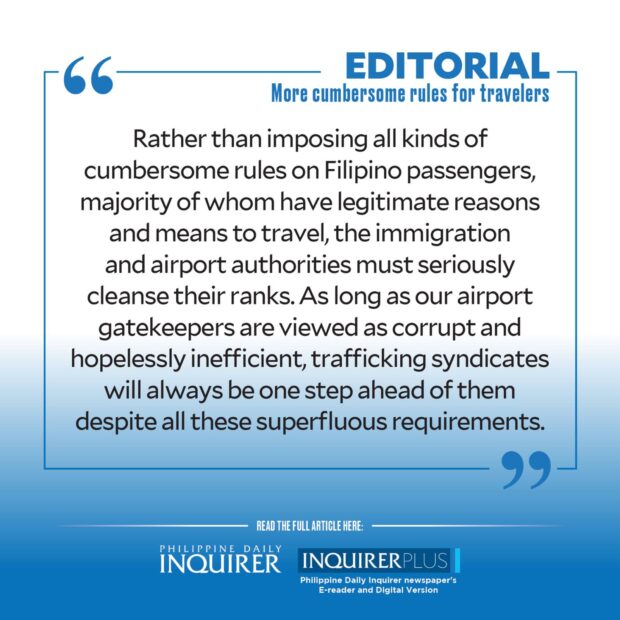More cumbersome travel rules
After horror stories of travelers being asked absurd questions or required to submit unreasonable documents by immigration officers, resulting in delays or even missed flights, new departure guidelines for Filipino travelers issued by the Inter-Agency Council Against Trafficking (IACAT) have triggered a new round of criticisms and anxiety.
Already, the Ninoy Aquino International Airport is ranked the eighth worst airport in Asia based on passengers’ queueing experience, according to property management and hospitality company Casago. Recent incidents of excessive questioning of travelers by the immigration officers (IO) have caused long lines at immigration counters, with some passengers being asked to present their college yearbooks or wedding pictures.
Article continues after this advertisementNow comes the new IACAT guidelines, which will take effect on Sept. 3, being justified as necessary to prevent rampant human trafficking. For tourists departing on “self-funded travels,” the new rules say: “In addition to the inspection of basic travel documents, the IO may propound relevant clarificatory questions and require the passenger to show additional supporting documents, when applicable, as follows: a. Confirmed return or roundtrip ticket; b. Proof of hotel booking/accommodation; c. Financial capacity or source of income consistent with the passenger’s declared purpose of travel; and d. Proof of employment and other equivalent documents.”
The Department of Justice later clarified that these are not new guidelines but merely “streamlined” ones and apparently targeted at first-time travelers who may raise red flags during immigration’s initial inspection. “As a general rule, travelers do not have to adjust. If in the past you’ve been able to depart without any issue, if you’ve been able to depart through the course of the primary inspection, chances are that’s going to be the case,” said IACAT head Nicholas Ty.
Travel guidelines should make the immigration process more efficient rather than cumbersome and open to abuse. But critics view the new IACAT protocols as infringing on Filipinos’ right to travel guaranteed under the Constitution, not to mention that requiring specific documents such as financial statements violates the right to privacy. At least one lawmaker pointed out that a traveler’s financial record is not a requirement in the Constitution. That these IOs enjoy a big amount of discretion in deciding the fate of a traveler also “makes the system quite susceptible to abuse and corruption and subjects travelers to the whims and caprices of these officers,” said Sen. Imee Marcos. Following the controversy, IACAT released a statement in its defense: “It is of paramount importance to emphasize that the Revised Guidelines have been formulated not to encroach upon the fundamental right to travel, but to serve as a protective bulwark shielding our fellow citizens from the dire perils of human trafficking.”
Article continues after this advertisementIn April, the Bureau of Immigration (BI) called on Filipinos to be vigilant and wary of job offers, particularly on social media, following an increase in human trafficking cases. Later that month, an IO was relieved for conniving with human trafficking syndicates and clearing three Filipino women who presented themselves as tourists to Malaysia but were actually headed for Lebanon to work as domestic helpers. The following month, another IO was fired for facilitating the departure of a couple who were trafficked to Myanmar. In both cases, the trafficking victims were instructed to queue at specific immigration counters for clearance. These cases prove that while thorough inspection of travelers is necessary to prevent trafficking, there is a deeper problem within the BI, which has long been riddled with corruption issues ranging from human trafficking to “VIP escort services” for international fugitives. It was only last year that 18 immigration personnel were sacked over the “pastillas” scheme, where foreigners mostly recruited for the Philippine offshore gaming operators were allowed to enter after paying bribes to immigration officers. Still, why does this problem continue to persist within the bureau?
The government should instead focus on addressing the root of why Filipinos are desperate to leave the country even if it means taking their chance through illegal means: poverty and lack of job opportunities. This is also where intelligence funds can be put to better use by running after human trafficking syndicates, whether those using social media platforms or those working within the bureau—quite literally, these traffickers are already right under the authorities’ noses. Rather than imposing all kinds of cumbersome rules on Filipino passengers, majority of whom have legitimate reasons and means to travel, the immigration and airport authorities must seriously cleanse their ranks. As long as our airport gatekeepers are viewed as corrupt and hopelessly inefficient, trafficking syndicates will always be one step ahead of them despite all these superfluous requirements.

















